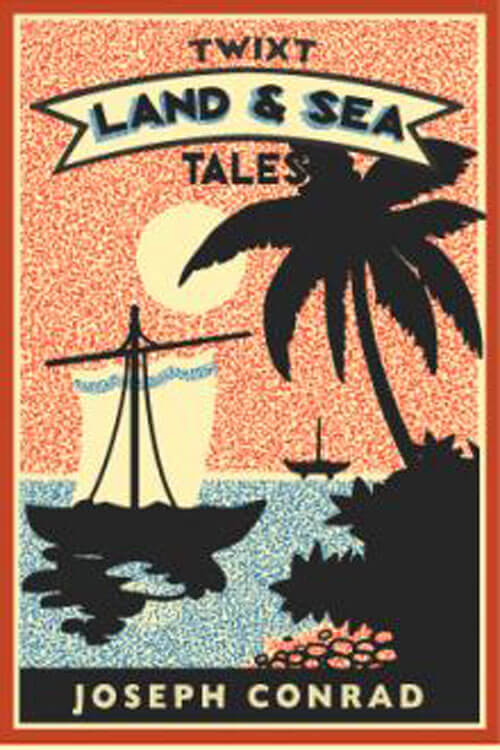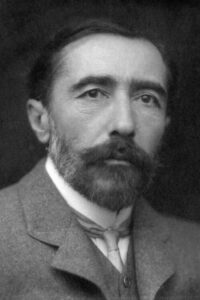
‘Twixt Land and Sea Tales
”I am not off to-morrow.”
“What of that? Do you think I am abusing old Jacobus’s hospitality? Heavens! It goes into the bill, of course. He spreads such little matters all over his account. He can take care of himself! Why, it’s business—”
I noted a shadow fall over his well-satisfied expression, a momentary hesitation in closing his cigar case. But he ended by putting it in his pocket jauntily. A calm voice uttered in the doorway: “That’s quite correct, Captain.”
The large, noiseless Jacobus advanced into the room. His quietness, in the circumstances, amounted to cordiality. He had put on his jacket before joining us, and he sat down in the chair vacated by the steamer-man, who nodded again to me and went out with a short, jarring laugh. A profound silence reigned. With his tired stare, Jacobus seemed to be slumbering and open-eyed. Yet, somehow, I was aware of being profoundly scrutinised by those heavy eyes. In the enormous cavern of the store, somebody began to nail down a case expertly: tap-tap … tap-tap-tap.
Two other experts, one slow and nasal, the other shrill and snappy, started checking an invoice.
Read or download Book
Joseph Conrad
Joseph Conrad 3 December 1857 – 3 August 1924) was a Polish-British novelist and short story writer.
Biography.
He is regarded as one of the greatest writers in the English language. However, he did not speak English fluently until his twenties. He came to be viewed as a master prose stylist who brought a non-English sensibility into English literature. He wrote novels and stories, many in nautical settings, that depict crises of human individuality amid what he saw as an indifferent, mysterious, and amoral world.
Conrad is considered a literary impressionist by some and an early modernist by others, though his works also contain elements of 19th-century realism. His narrative style and anti-heroic characters, such as in Lord Jim, have influenced numerous authors. Many dramatic films have been adapted from and inspired by his works. Multiple writers and critics have commented that his fictional works, written mainly in the first two decades of the 20th century, seem to have anticipated later world events.
Writing near the peak of the British Empire, Conrad drew on the national experiences of his native Poland—during nearly all his life, parcelled out among three occupying empires—and on his own experiences in the French and British merchant navies, to create short stories and novels that reflect aspects of a European-dominated world—including imperialism and colonialism—and that profoundly explore the human psyche.
Writer
In the autumn of 1889, Conrad began writing his first novel, Almayer’s Folly.
The son of a writer, praised by his (maternal) uncle (Tadeusz Bobrowski) for the beautiful style of his letters, the man who from the very first page showed a serious, professional approach to his work, presented his start on Almayer’s Folly as a casual and non-binding incident… Yet he must have felt a pronounced need to write. Every page right from the first one testifies that writing was not something he took up for amusement or to pass time. Just the contrary: it was a serious undertaking, supported by careful, diligent reading of the masters and aimed at shaping his own attitude to art and to reality…. We do not know the sources of his artistic impulses and creative gifts.
Conrad’s later letters to literary friends show the attention that he devoted to analysis of style, to individual words and expressions, to the emotional tone of phrases, to the atmosphere created by language. In this, Conrad in his own way followed the example of Gustave Flaubert, notorious for searching days on end for le mot juste—for the right word to render the “essence of the matter.” Najder opines:
“Writing in a foreign language admits a greater temerity in tackling personally sensitive problems, for it leaves uncommitted the most spontaneous, deeper reaches of the psyche, and allows a greater distance in treating matters we would hardly dare approach in the language of our childhood. As a rule it is easier both to swear and to analyze dispassionately in an acquired language.”
In 1894, aged 36, Conrad reluctantly gave up the sea, partly because of poor health, partly due to unavailability of ships, and partly because he had become so fascinated with writing that he had decided on a literary career. Almayer’s Folly, set on the east coast of Borneo, was published in 1895. Its appearance marked his first use of the pen name “Joseph Conrad”; “Konrad” was, of course, the third of his Polish given names, but his use of it—in the anglicised version, “Conrad”—may also have been an homage to the Polish Romantic poet Adam Mickiewicz’s patriotic narrative poem, Konrad Wallenrod.






